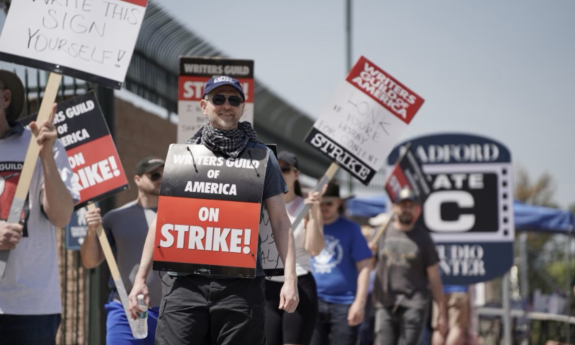Duke Diary Dispatch: When Hollywood Shuts Down

Streaming has led to a fundamental reimagining of distribution models. Since the advent of film at the turn of the 20th century, films have been released theatrically. However, streaming has led to a divergence in distribution strategy. Do you release your film theatrically or straight to VOD (video-on-demand)? Netflix’s release of Glass Onion: A Knives Out Mystery directly onto their streaming service, rather than a theatrical run like Knives Out, is a prime example of the changing times. The Covid-19 pandemic has also changed how willing audiences are to attend theaters, as many have gotten used to watching films on subscription services at home. Thus, the box office has shifted toward larger, big-budget blockbusters, avoiding the risk of a mid-budget or indie flop. A24, however, has proven with an incredible track record that independent filmmaking can still be successful with the right storytelling, marketing, and publicity.
I spoke with Duke alum Chaz Hawkins (‘17), a breakout WGA screenwriter who has worked in writer's rooms for HBO’s Who Fears Death and Amazon Prime’s Fallout, about the current plight of writers.
He told me: “This strike is life or death. AMPTP aims to keep us poor and powerless, so they can continue to abuse us and every other part of the industry. They seek to create modern-day monopolies through streaming that severely threaten our wages. We writers want security. We want to ensure that there’s a middle class in our industry. We want to work under fair conditions.
We want to be able to see our projects through the production process to help all other departments because the writing is never done when you type ‘fade out.’ This strike is one of the most important things I have ever been a part of, particularly as a WGA member of color.”

The SAG-WGA strike comes at the time in which the streaming bubble has popped. During the pandemic, major studios spent enormous sums to race to get their streaming service up and running. Every studio was competing to launch their service as folks had nothing to do but stay inside on their devices. Now that the pandemic has ended, in conjunction with rising inflation, the entertainment industry has contracted heavily and studios are cutting costs with massive slices. All across the board, layoffs have occurred. Studios are restructuring, looking to increase cash flow and eliminate non-essential operations to pay off their huge debt loads from pandemic-era spending.
Thus, the current strike is going to be an entrenched, bloody war between two sides that refuse to give in. For creatives, it’s a now-or-never moment as AI and streaming threaten their livelihood. Writers and actors are fed up with the hypocrisy of C-suite greed and refusal to fairly compensate their employees’ labor; look no further than Bob Iger’s out-of-touch interview at Allen & Co. Sun Valley Conference for immensely wealthy execs. SAG-WGA demands what they are rightly owed for their essential creative labor—without them, there is no entertainment industry.

Studio execs are ready for the siege warfare though, already planning their summer vacations. They expect this stalemate to last well into September, perhaps even later. They believe that accepting SAG-WGA’s demands would worsen their financial situation and lead to less content being produced, meaning more creatives out of work. During the strike, the suits argue that many laborers adjacent to the film industry (such as caterers, below-the-line crew, etc.) will go out of business. The demands might also lead to higher prices for streaming subscriptions, translating to fewer subscribers.
Only time will tell how this battle will play out.
Reporting from the front lines, Brooks Finby